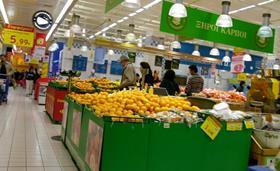
Greek fruit and vegetable exports rose by 21.8 per cent to €371.2m between January and May 2013, according to Incofruit-Hellas, but the increase is undoubtedly related to the dire state of the domestic market as a result of the country's financial crisis, encouraging companies to look abroad for sales.
Ordinary Greeks have been hit by tax increases, cuts to benefits and pensions and redundancies, influencing not only purchasing choices, but also overall living standards, habits and life styles.
“The market continues to underperform, and local sales are at the same level as the last few years,' said George Kallitsis of exporter Protofanousi Fruits. 'We have almost stopped selling to the domestic supermarkets, as they tend to take small volumes from a large number of suppliers and their payments come later than others, so we need to focus on exports.”
Konstantina Bouman of Greekfruits.eu, an online portal designed to assist Greek fresh produce firms, said that the increase in exports was due, at least in part, to new players on the market, and she revealed that her portal had received a large number of visitors in recent months.
'Russia is importing large volumes of Greek peaches, the UK continues to be a good market for Greek Thompson Seedless grapes and demand for Greek kiwifruit is high as Greece is earlier than elsewhere in Europe,' she said.
However, the decision by many Greek companies to turn to exports in an effort to compensate for the loss of domestic sales has created issues for the more traditional exporters.
“In a depressed European market, this increase in the number of suppliers has only worsened the problem of oversupply,” stated George Frangistas of exporter Gefra.
Oranges accounted for the majority of Greek fruit exports at 226,845 tonnes, according to figures from Incofruit-Hellas, while strawberry exports reached a record volume of 29,924 tonnes, a 35 per cent increase on the year-earlier period.



